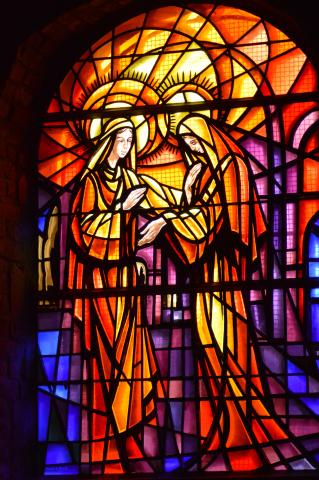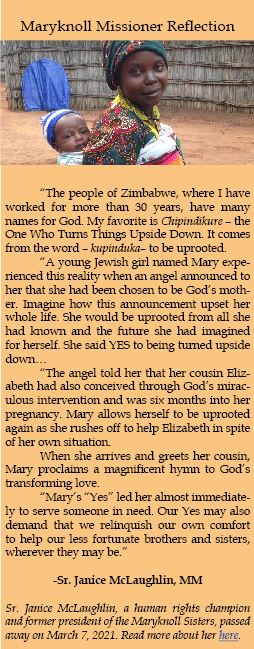This advent guide was produced by the Maryknoll Office for Global Concerns.
First Week in Advent: A Crossroads Before Us
“In those days Judah shall be safe and Jerusalem shall dwell secure;
this is what they shall call her: “The LORD our justice.”
– Jeremiah 33: 16
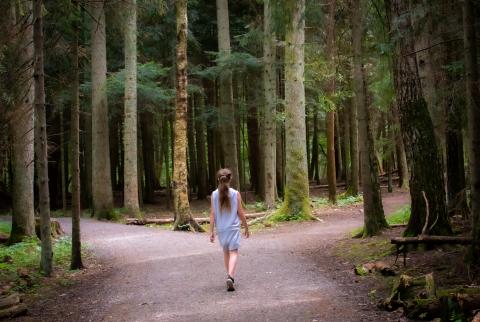
What would it feel like to “dwell secure?” How can we maintain faith in God’s promise of his coming reign of peace, and how are we called to help bring it about?
The psalm and second reading provide some guidance. The psalmist begs God to “teach us your paths,” and reminds us that God “guides the humble to justice and teaches the humble his way.” In the second reading, St. Paul prays, “May the Lord make you increase and abound in love for one another and for all…so as to strengthen your hearts…[for] the coming of our Lord Jesus with all his holy ones.”
These readings remind us that, in times of great uncertainty, we are to trust in God’s guidance, and remain vigilant. The way we prepare for God’s reign of peace and security is by “increasing and abound[ing] in love for one another and for all,” building up love and solidarity in our community.
Pope Francis builds on a long tradition of Catholic social thought in emphasizing the importance of what he calls “social friendship” and solidarity in his latest encyclical, Fratelli Tutti. He explains that the fabric of society wears down when we fail to recognize each other as “brothers and sisters all,” fundamentally related through being created and loved by God.
We see this breakdown at the heart of our many social challenges today – all of which, Pope Francis reminds us, have spiritual roots. As a society, we seek security through building up nuclear weapons arsenals built to annihilate whole populations. We fail to share life-saving COVID-19 vaccines due to corporate interests and lack of political will or concern for people abroad. We use up vast quantities of natural resources at the expense of those who are poor and live close to the land.
In the midst of these great challenges, through the Gospel today, Jesus calls us to “be vigilant at all times,” not too absorbed in the “anxieties of daily life” to pay attention for the small but powerful signs of God’s coming Kingdom.
Although the problems of our day loom large, we may take meaningful steps to “increase in love for one another and for all” and so challenge the structures of society which deny the equal dignity of each person and the inherent value of creation. Only through building habits and structures of love and solidarity will we “dwell securely.”
Maryknoll Sr. Teruko Ito writes, ´Today we find ourselves at another crossroads politically, culturally, and spiritually, as we face climate change, ecological crisis, racial conflict, and the challenges of a global pandemic. Challenged with many complex issues today, we all struggle to believe in God’s faithfulness through our unknown and unpredictable history.
Today, let us individually and communally review our past, where we came from, and profess who our God is, in and beyond human history…Oh God, you are the wholeness of life!”
Questions for Reflection:
What does it mean to seek false security? What is one step you can take to foster love and solidarity in your community?
Prayer
Prayer for Disarmament
Breath of All that Is,
Preserve us from our own madness.
Direct us away from dealing destruction to others, A path which leads to the ruin
Of ourselves and our world.
Protect us. Help us to hear You.
Jesus Christ, Beloved,
Show us your precious face in all others,
You in us, and we in each other, from all places.
Teach us how to lower our defenses, Feed us Love which transcends fear. Heal us. Help us to let go of all fear.
Holy Spirit, You
Call us, in our minds, in our world,
And through each other. Speak to us.
Speak through us.
When we worship power, control, money,
When we cannot forgive, or shove pain onto others, Call us.
Light the fire of Love. We will not be afraid. We will not be afraid. Love transcends all fear.
You Are with us always.
Amen
-Kim Vanderheiden, Pax Christi Northern California
Second Week in Advent: Renewal of All Creation
Sunday, December 5, 2021
Baruch 5: 1-9; Psalm 126: 1-2, 2-3, 4-5, 6; Philippians 1: 4-6, 8-11; Luke 3: 1-6
“For God will show all the earth your splendor; you will be named by God forever
the peace of justice, the glory of God’s worship.”
– Baruch 5: 3-4
In this second Sunday of Advent, the readings focus on preparing for the coming of Christ through repentance and asking for God’s healing.
St. Paul prays that we grow in love and discernment “of what is of value,” so that we may be “pure and blameless for the day of Christ.” In the Gospel, we hear of John the Baptist preaching a “baptism of repentance,” according to the prophecy of Isaiah. In the words of the prophet Isaiah, in preparation for the Messiah, “every valley shall be filled…every mountain and hill shall be made low…all flesh shall see the salvation of God.”
We are reminded that God’s reign of peace will involve all creation, a reign of right relationship between all created things. This means our preparation for his coming must involve repentance for the ways in which we have sinned against God, our neighbors, and against creation itself.
In this time of healing from the global pandemic, Pope Francis has asked us to see this time of recovery as a turning point from the ways in which we have devalued our neighbors and God’s precious Earth, destroying or exploiting what was good and beautiful for the sake of short-term gain or profit. As we survey what went wrong in our response to the pandemic, we can see that it is part of a larger pattern of powerful interests ignoring the cry of the poor and the Earth. We can see how we, too, are guilty of perpetuating this cycle.
This August, the UN’s Intergovernmental Panel on Climate Change released a new report putting in the starkest terms yet the situation facing all life on Earth if humans continue their patterns of consumption of fossil fuels and reckless pollution of natural resources. The window of time during which it is possible to stop catastrophic climate change is quickly closing, the report said, and decisive action is needed immediately in order to change course.
While it is true that action is needed at the highest levels of government and the corporate world to make sweeping changes, we as Christians can recognize the roots of our society’s disregard of the sacredness of creation in our own attitudes and behaviors. In Advent, as we meditate on the images from the Prophet Isaiah of the whole Earth responding to the coming of Christ, we can prayerfully discern ways of enacting our repentance of abuse of the Earth.
Maryknoll lay missioner Peg Vamosy writes, “All of creation is waiting to see what we humans choose to do. Will we rush back to ‘normal’ patterns of consumerism, convenience, comfort, and indifference to anyone or anything but ourselves, or will we embark on a new path to restore the earth to right relationships, with God, with each other and with all of creation?
“…[This] should be an opportunity and a time of hope, because we can transform this reality. We don’t have to return to the normal we left behind; we can choose a more fertile ground in which to plant the seeds for the harvest that God wills.”
Questions for Reflection:
How have you been changed by the experience of the pandemic? What is one step you can take to “restore” your relationship with God, neighbor, or creation?
Prayer
A Prayer for Care of Creation
Reader: Lord, allow my ears to listen to the cry of the Earth,
the voices of my sisters and brothers,
those who face the harsh reality of climate change.
All: Lord, I come to do your will.
Reader: Lord, allow my eyes to see the beauty of creation,
in flowers, creatures, forests, and cities alike.
All: Lord, I come to do your will.
Reader: Lord, allow my voice to speak out for justice and ensure people living in poverty are heard.
All: Lord, I come to do your will.
Reader: Lord, allow my hands to care for the Earth,
to toil, to reap, to celebrate.
All: Lord, I come to do your will.
Reader: Lord, allow my feet to take the path less trod, to walk the extra mile,
to take your message out to the world.
All: Lord, I come to do your will.
Prayer by Father Michael Fitzsimmons/CAFOD
Third Week in Advent: Seeds of Hope
Sunday, December 12, 2021
Zephaniah 3: 14-18a; Isaiah 12: 2-3, 4, 5-6; Philippians 4: 4-7; Luke 3: 10-18
“Cry out with joy and gladness: for among you is the great and Holy One of Israel.”
– Isaiah 12: 2

These invitations to rejoice freely without anxiety can feel empty as we face a world full of turmoil and suffering. What do these invitations mean? Where can we find the strength and inspiration to rejoice amidst the challenges facing our society and world?
John the Baptist’s words in today’s Gospel provide some direction.
In response to John’s call to “repent” and “prepare the way of the Lord,” the crowds ask him, “What should we do?” He calls on them to seek charity and justice: “Whoever has two cloaks should share with the person who has none.” To the soldiers and tax collectors he says, “Stop practicing extortion.”
John’s words “[fill] the people with expectation” and make them wonder if he is the Messiah. He replies, “One mightier than I is coming. I am not worthy to loosen the thongs of his sandals.”
John instructed the people to pursue acts of justice and charity according to their means and role in society. In his own life, John had deep faith that his work was only the beginning of the transformation that is to come – he could contribute to God’s mission through his preaching and had a childlike faith that Jesus would fulfill the work he had begun.
His example can help us reflect on how we can begin to set right the wrongs we see in society around us, and yet have faith that our efforts, though drops in the bucket, will be completed and fulfilled by the work of God. The peace and rejoicing we are called to this Advent is not a callous merriment that avoids the reality of suffering, but a divine peace that surpasses our understanding. It is a peace that is cultivated by our taking a first step, responding to God’s call to “prepare the way.”
Every vaccine dose shared around the world, every letter to a representative written, every effort to protect the climate, and every moment spent in prayer is worthwhile, contributing to the deposit of goodness that prepares the way for God’s Kingdom. As we prepare to welcome Christ as a child, may we grow in our childlike faith.
Maryknoll lay missioner Debbie Northern writes, “In my nearly 23 years of mission, I have seen tremendous faith in the people with whom I have worked. In the midst of poverty, oppression, and injustice, they are able to put their trust in God and persevere. As they say in El Salvador, “Dios primero” (God first). As someone who comes from the United States, I often think I can do things on my own and forget to trust in God.”
Questions for Reflection:
When have you been inspired by someone’s example of childlike faith? What is one step you can take to promote justice and charity in your daily life?
 Prayer
Prayer
Prophets of a Future Not Our Own
It helps, now and then, to step back and take a long view. The kingdom is not only beyond our efforts, it is even beyond our vision.
We accomplish in our lifetime only a tiny fraction of the magnificent enterprise that is God’s work. Nothing we do is complete, which is a way of saying that the Kingdom always lies beyond us.
No statement says all that could be said.
No prayer fully expresses our faith.
No confession brings perfection.
No pastoral visit brings wholeness.
No program accomplishes the Church’s mission.
No set of goals and objectives includes everything.
This is what we are about.
We plant the seeds that one day will grow.
We water seeds already planted, knowing that they hold future promise. We lay foundations that will need further development. We provide yeast that produces far beyond our capabilities.
We cannot do everything, and there is a sense of liberation in realizing that.
This enables us to do something, and to do it very well.
It may be incomplete, but it is a beginning, a step along the way, an
opportunity for the Lord’s grace to enter and do the rest.
We may never see the end results, but that is the difference between the master builder and the worker.
We are workers, not master builders; ministers, not messiahs.
We are prophets of a future not our own.
-Bishop Ken Untener
Fourth Week in Advent: He Shall Be Peace
Sunday, December 19, 2021
Micah 5: 1-4a; Psalm 80: 2-3, 15-16; 18-19; Hebrews 10: 5-10; Luke 1: 39-45
“Blessed are you who believed that
what was spoken to you by the Lord would be fulfilled.”
– Luke 1: 45
In the first reading this Sunday, the Prophet Micah proclaims, “You, Bethlehem-Ephrathah, too small to be among the clans of Judah, from you shall come forth for me, one who is to be ruler in Israel, his greatness shall reach to the ends of the Earth; he shall be peace.”
In the Gospel, we hear of the interaction between two women who miraculously find themselves pregnant – Elizabeth, who was “advanced in years,” and Mary, who was unwed. They marvel at God’s work in their lives.
In reading their story, we, too, can marvel at the humble way through which God chose to come into our world. Christ was born in Bethlehem, a city Micah recalls as “too small” and insignificant to be among the clans of Judah, born as a helpless infant to a poor, obscure teenage mother. How could this event possibly be the source of all of our salvation?
It speaks to one of the deepest truths of the Christian faith: that God values and lifts up that which the world considered worthless, sees those who are obscure, empowers those who are powerless.
During the dark days of the pandemic, we have become more aware of our powerlessness and insecurity. The health and economic crises, on top of the climate crisis, have exposed the truly vulnerable in our society and the ways our global systems value some lives and disregard others.
On a national level, this was made manifest in the fact that Black, Indigenous, Latino, and Pacific Islanders experienced a death rate from COVID-19 more than double that of white or Asian Americans. Those who worked as “essential workers” – often in unprotected, minimum wage-jobs – were put at grave risk. On an international level, lockdowns allowed some security for the elite while leaving millions of impoverished people cut off from jobs, schooling, even food. We see the way much of the global population has no vaccine access, while wealthy countries contemplate booster shots with their excess doses.
As we conclude Advent and prepare to celebrate Christmas, we are invited through the story of Christ’s miraculous and humble birth to have hope amidst these overwhelming global challenges.
Reflecting on the scene between Mary and Elizabeth, Maryknoll lay missioner Claire Stewart in Brazil writes, “I suppose, in many ways, by saying, ‘Yes’ Mary realized her decision to assume the presence of Christ within herself affected more than just her, but the millions of people who have been born since then. When she shared the good news with Elizabeth, Mary created a communion of joy between herself and Elizabeth. We have the opportunity to use Mary’s example daily by being a witness to God in whatever ways God is calling us.
“By sharing Christ with others just as Mary did with Elizabeth, there is an opportunity to allow new life to flourish. We never know what goodness may come from the smallest of our actions, whether it be a nod of acknowledgment or a short conversation.“
Questions for Reflection:
Who are the people who are disregarded or unvalued in your community? How are you being invited to say “Yes” to God’s will in this Advent season?
Prayer
Mary’s Prayer: The Magnificat
My soul proclaims the greatness of the Lord,
my spirit rejoices in God my Savior,
for he has looked with favor on his lowly servant.
From this day all generations will call me blessed:
the Almighty has done great things for me,
and holy is his Name.
He has mercy on those who fear him
in every generation.
He has shown the strength of his arm,
he has scattered the proud in their conceit.
He has cast down the mighty from their thrones,
and has lifted up the lowly.
He has filled the hungry with good things,
and the rich he has sent away empty.
He has come to the help of his servant Israel
for he has remembered his promise of mercy,
the promise he made to our ancestors,
to Abraham and his children forever.
Amen.

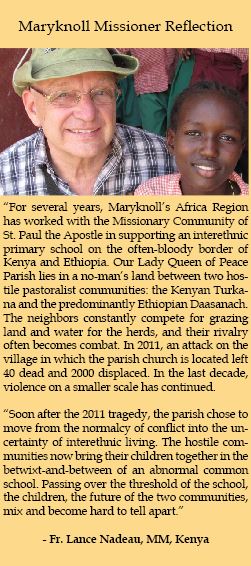
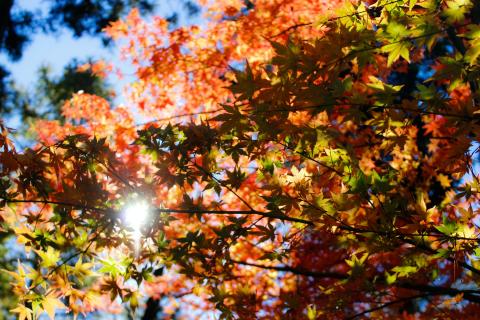
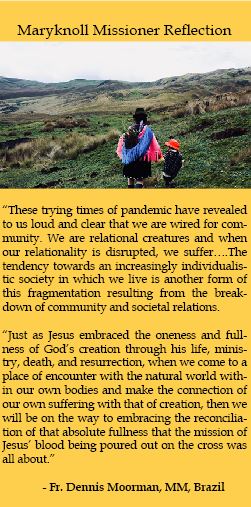
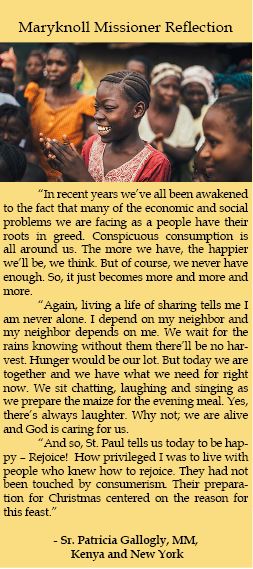 Prayer
Prayer